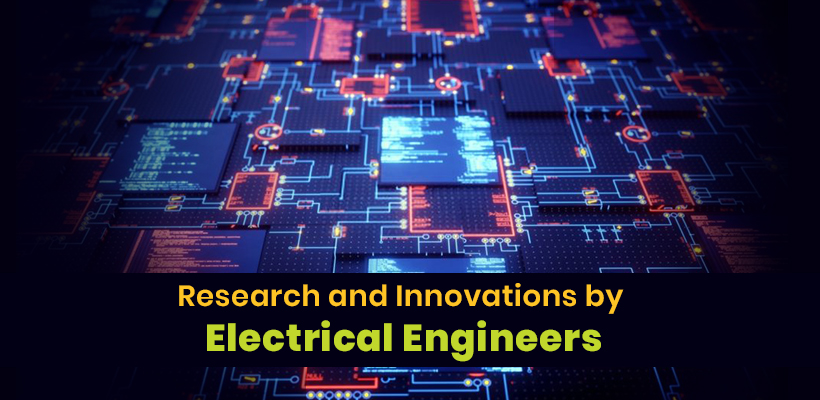Electrical and electronic engineering is a demanding engineering discipline with an extensive and varied curriculum. The subjects taught in electrical engineering are related to the foundations of the applied natural sciences. The electrical engineering career opportunities are well suited to the difficulty of the course. With so many engineering graduates graduating from college with questionable skills each year, attractive managerial career opportunities are opening up for electrical engineers in large companies around the world. The field of electrical engineering is vast and there are many job opportunities in electrical engineering as below:
Scope of Electrical And Electronics Engineering
Modern times rely heavily on electrical and electronic products. Their production is one of the main driving forces of the modern economic system. In developing countries like India, qualified electrical and electronic engineers are in demand to fill positions in key manufacturing sectors of private and public industry. A global supply chain system requires skilled professionals in the local electrical industry.
Transportation and heavy industry rely on electrical engineers to perform their daily tasks with high efficiency and profitability.
Types of Job Roles of an Electrical Engineer:
Micro Electrical Engineer
Microelectronics is a subspecialty within the field of electronics, devoted to the design and development of microchips. The main difference between microelectronics and electronics is that they are strictly components on a much smaller scale. Microelectronic components are ubiquitous in modern society and can be found in almost everything. Computers, tablets, mobile phones, vehicles, and many other devices and systems that require or use electronics. A microelectronics engineer’s sole purpose is to design microchips for a variety of uses. However, due to our detailed knowledge of these components, we can also be involved in designing, planning and organizing the manufacturing process of these small electronic components. The top electrical engineering courses in Maharashtra train you to become an electrical engineer.
Electrical Engineer
Electrical and electronic engineers work in industries such as research and development, engineering services, manufacturing, telecommunications, and federal government. Electrical and electronic engineers typically work indoors in offices. However, in some cases it may be necessary to visit the site to observe problems or complex devices. Employers also value practical experience, such as attending internships and joint engineering courses. A career in electrical engineering trains you to be become an effective electrical engineer
Power Engineer
Energy technology, also called energy system technology, is a branch of electrical engineering that deals with the generation, transmission, distribution and use of electrical energy. Power engineering is also related to the design and development of electrical equipment used in the generation, transmission, distribution and utilization of electrical energy. Power engineering professionals are in high demand in companies involved in power generation, transmission, distribution, and the design and development of electrical equipment such as generators and transformers.
Power engineering courses are offered at many institutions, including the National Power Training Institute, including graduate and graduate levels. Some institutions also offer Diploma courses in Energy Technology. The power engineering curriculum includes topics such as power generation engineering, energy distribution and utilization, manufacturing and industrial engineering, power plant maintenance, and power plant operations.
Instrumentation Engineer
Instrumentation engineering is the field of engineering that specializes in the principles and operation of measuring instruments used in the field of design, configuration of automated systems in the electrical and pneumatic fields, etc.
Telecommunications Engineer
Telecommunications engineering is an engineering discipline focused on electrical and computer engineering, aimed at supporting and improving telecommunications systems. Their work ranges from simple circuit design to strategic mass development. Telecommunications engineers are responsible for planning and supervising the installation of telecommunications equipment and facilities such as: B. Complex electronic switching systems and other simple telephone service equipment, fiber optic cables, IP networks, and microwave transmission systems. Communication engineering overlaps with broadcasting engineering.
Telecommunications is a diverse engineering field related to electrical engineering, civil engineering, and systems engineering. Ultimately, communications engineers are responsible for providing high-speed data transmission services. Design the infrastructure of communication networks using a variety of devices and transport media. The most commonly used media for wired communications today are twisted pair cable, coaxial cable, and fiber optics. Telecommunications engineers also provide solutions related to wireless modes of communication and information transmission, such as wireless telephone services, cellular and satellite communications, Internet, Wi-Fi, and broadband technologies
Electrical Design Engineer
Electrical engineers work in the aerospace, architecture, energy, research, and mechanical engineering industries. The path to becoming an electrical designer is similar to that of an engineer, but with an emphasis on developing electrical systems. If you’re interested in designing and maintaining complex electrical systems, a career in electrical design might suit you. In this article, we will discuss the careers of an electrical design engineer, their duties, skills, salaries, and steps to become one. Electrical designers are experts in designing electrical systems such as alarms and lighting. We use our extensive knowledge of physics and materials science principles to design new electrical system solutions and provide maintenance or installation services for current electrical systems.
In conclusion, the electrical engineering courses in Nashik prepare you for various roles in electrical engineering. It can therefore be seen that the scope of this profession is on rise and many jobs are coming up in this field.

